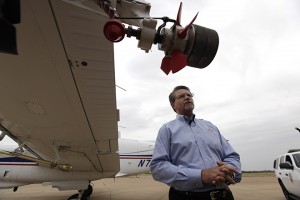
Mike Stuart of Dynamic Aviation describes the plane that will be used for aerial spraying and its difference from crop dusting during a news conference on Thursday in Dallas.
By Sarah Kuta
Associated Press
DALLAS — The last time Dallas used aerial spraying to curb the mosquito population, Texas’ Lyndon Johnson was in the White House, Mission Control in Houston was launching Gemini missions and encephalitis was blamed for more than a dozen deaths.
But for the first time in more than 45 years, Dallas County has launched an aerial assault on the flying pests. Aircraft took off at 10 p.m. Thursday to spray insecticide over the county’s northeastern quadrant to combat the nation’s worst outbreak of West Nile virus. That outbreak has killed 10 people and caused at least 230 others to fall ill.
“I cannot have any more deaths on my conscience because we did not take action,” Dallas Mayor Mike Rawlings said.
Although commonplace in other major cities, the efforts are provoking a debate in the Dallas area between health officials trying to quell disease risk and people concerned about insecticidal mist drifting down from above.
Nearly half of all West Nile cases in the United States so far this year are in Texas, according to the Centers for Disease Control and Prevention. If the trend continues, 2012 will be the worst West Nile year in state history.
The hot, dry weather across the nation’s midsection has created ideal conditions for some species of mosquito. The heat speeds up their life cycle, which accelerates the virus replication process. And during a drought, standing water can quickly turn stagnant when it’s not flushed away by rain or runoff.
In a coincidence Thursday, a Texas jury further south in DeWitt County awarded nearly $1 million to a Union Pacific employee who says he contracted West Nile virus while on the job after Hurricane Ike in 2008. Attorney Michael Sheppard said railroad worker Billy Nami, 62, lost more than half his cognitive function after being infected.
Both the mayor and Dallas County Judge Clay Jenkins have declared a state of emergency and voiced their support for an aerial defense. Yet even with the threat of infection, the spraying has sparked widespread opposition from people who fear the chemicals could be harmful.
“It’s something new there that has not been used in quite a number of years,” said Dr. Roger Nasci of the CDC, explaining the public’s worries. “Anything novel comes with that unknown factor.”
Because of the severity of the outbreak, the Texas Health Department is stepping in to oversee the effort and to pay for it.
“This year is totally different from the experience Texas has had in the past,” state Health Commissioner Dr. David Lakey said. “If it’s nuisance mosquitoes, we ask the city or county to pay part of that. But in the midst of this disease outbreak, it’s easier for us to go ahead and do it.”
A national spraying company called Clarke was set to deploy two to five Beechcraft King Air twin-engine planes late Thursday night for three hours of spraying.





